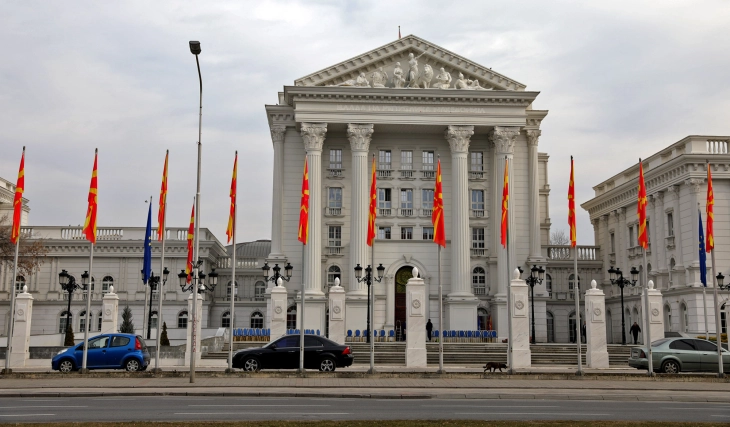Law on restrictive measures withdrawn from parliamentary procedure, opposition accuses of attempt to protect officials who should be held accountable
- The Government withdrew from parliamentary procedure the draft law on restrictive measures due to administrative reasons, noting that it would be on the agenda at its next session. The opposition said this was an attempt to protect officials from the SDSM and DUI government who should otherwise be held accountable.

Skopje, 2 February 2024 (MIA) - The Government withdrew from parliamentary procedure the draft law on restrictive measures due to administrative reasons, noting that it would be on the agenda at its next session. The opposition said this was an attempt to protect officials from the SDSM and DUI government who should otherwise be held accountable.
Speaking at a press conference on Friday, VMRO-DPMNE spokesperson Marija Miteva asked what SDSM and DUI were afraid of.

"Talat Xhaferi withdrew the law which should hold accountable all those officials and businessmen of the SDS and DUI government. What has DUI told strategic partners about the law on the blacklists? Perhaps it is not considered a European law? Because the false European coalition of DUI and SDS is afraid. They should answer these questions. The future offered by SDS is a future in which the Macedonian party is a servant in the government and blindly serves these DUI criminals. That is the future with SDS. With such a government it would not take 100 years, but 200 years to join the EU. Thus, it is clear why in public opinion polls only 4 percent of voters respond with a "yes" to the question of whether they believe that the government can bring us in the EU by 2027. Even their supporters do not believe in what SDS is saying," said Miteva.
Earlier on Friday, BESA came out with a statement saying that the law has been withdrawn "to protect the criminals added to the blacklist of the United States".

"Talat Xhaferi withdrew the law which should hold accountable all those officials and businessmen of the SDSM-DUI government, who were added to the blacklist of the United States due to their involvement in financial crime, mainly by abuse of authority and getting rich at the cost of citizens. DUI's masks fell off very quickly. The fact that the caretaker Prime Minister Talat Xhaferi decided to technically save the criminals, who are also confirmed to be criminals by the United States, is out in the open," reads BESA's statement.
The Government said Thursday that amendments to the law on restrictive measures have been withdrawn from parliamentary procedure due to administrative reasons, and it is expected to endorse them again at its next session.

"Due to the election of the new government, the draft-amendments will administratively be again approved at the next session and then forwarded to the Parliament," said the executive on Thursday.
On January 16, the Government unanimously expressed its political will to submit the law amendments to the Parliament.
Proposed amendments to the Law on Restrictive Measures would introduce U.S. and UK legal acts as a basis for local courts to order legal sanctions be levied against individuals and companies.
Foreign Minister Bujar Osmani said the goal will be the maintenance of international peace, security, respect for human rights and basic freedoms, as well as fight against corruption.

The U.S. Department of State recently added to its "blacklist" several more familiar names, including former Deputy Prime Minister for Economic Affairs Kocho Angjushev, businessmen Orce Kamchev and Sergey Samsonenko, and Struga Mayor Ramiz Merko. They joined the already blacklisted fugitive former Prime Minister Nikola Gruevski and the convicted former head of the country's Administration for Security and Counterintelligence Sasho Mijalkov.
U.S. top officials have also stressed the importance of taking a more decisive approach in dealing with corruption. At a press briefing last year, United States Ambassador to North Macedonia Angela Aggeler welcomed the Government's move to put forward a law on opening investigations for those who are placed on the U.S. blacklist, as is the case with the EU and UN lists. However, Aggeler underlined that there is an epidemic of corruption in the country, prevalent in all walks of life.

"We see an epidemic of corruption in this country. It is present in all sectors and all organizations, and by naming corrupt actors we can start helping this country to deal with this," Aggeler noted, without saying whether the list would be extended.
U.S. Assistant Secretary of State for European and Eurasian Affairs, James O’Brien, who was visiting Skopje for the leaders’ meeting on the Growth Plan for the Western Balkans last week, also did not provide an answer to that question. In an interview with MIA, speaking about blacklists and their real effect, he said that they are just part of the solution.
“They are just a part of the solution. The important thing is that public goods be available to all the public, that there be equal justice and not immunity for some and prosecution for others, and that there not be favoritism in, let’s say allocation of contracts. That requires an entirely new approach to many of the governmental processes. That does take time and even in my country it took a long time, but we can see real benefits from pursuing this course already. The sanctions and blacklists are just one piece, but they are only effective if they become a part of a wider change in the system. That would be one thing that we discuss here as well,” O’Brien told MIA.
At a joint press conference with Prime Minister Dimitar Kovachevski, after a meeting of leaders from the region over the European Commission’s Growth Plan for the Western Balkans, O’Brien declined to comment on any legislative processes of either North Macedonia or the EU, adding that the question of the US sanctions' role in the fight against corruption was somewhat complex.

“There were strategies for solving the favoritism of a captive state and corruption, which were problems all around the world, not only in the region. I am grateful that the government had started a program to fight against corruption. A list is a list. It is always evolving. The goal is to see a behavior change in the individuals on the list and their associates. The list, which was a part of a larger strategy, could be expanded with new names or perhaps some names would be removed. The goal of the US sanctions related to corruption is to see a change in the behavior of the individuals on the list and their associates; the US wants people to get used to using all tools available for fighting corruption and for the new government to maintain this commitment,” O'Brien said.
North Macedonia was ranked 76th out of 180 countries on Transparency International's 2023 Corruption Perception Index, up two points to a total of 42 points in 2023. However, according to Transparency International's methodology, any result below 50 points is considered a high level of corruption in a country and a failure in its fight against corruption.
The CPI 2023 report notes that in September 2023, North Macedonia's parliament significantly undermined its judiciary. In a non-transparent and fast-tracked procedure, MPs amended the criminal code to reduce prison sentences and shorten the statute of limitations for the abuse of official positions. This, reads the report, will cause roughly 200 suspected corruption cases to be dismissed, many of which involve former high-level officials.
Out of 180 countries, on a scale of zero to 100, where zero is highly corrupt and 100 is very clean, North Macedonia has the same score as Bahrain, China, Cuba, Hungary, Moldova and Trinidad and Tobago. Denmark heads the ranking for the sixth year in a row, with a score of 90. Finland and New Zealand follow closely with scores of 87 and 85. The 2023 Corruption Perceptions Index (CPI) shows that corruption is thriving across the world.
Photo: MIA archive







